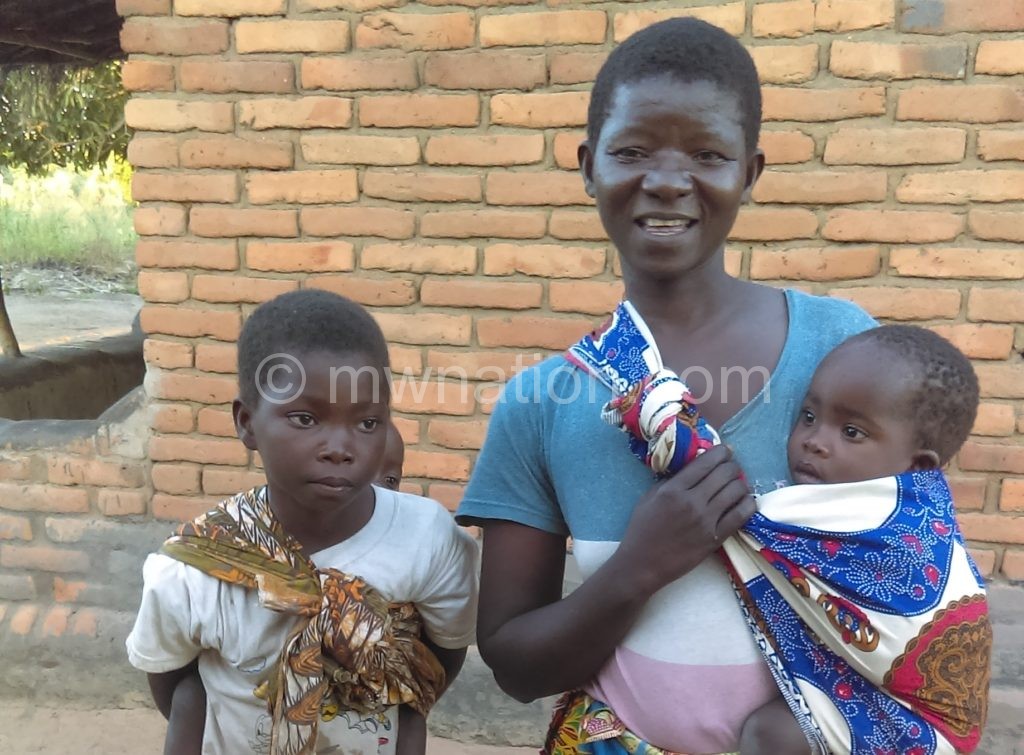Reducing stunting at household level
On a sun-lit May afternoon, Elizabeth Maulidi, 34, from group village head Chibothera’s area in Nkhotakota arrives from a maize mill which is about two kilometres (km) from where she lives.
The mother of three is in the company of her first-born daughter, both of them carrying children on their backs.

The two children are twins, Evelyn and Evelless, born two years ago. And just a year ago, they were among the one million children under five years in the country suffering from chronic malnutrition and stunting.
Her efforts to help the children get back in shape saw her taking back to back trips to Nkhotakota District Hospital from where she got chiponde (peanut butter-based therapeutic food) to feed them; and the twins have since graduated from stunting.
“I would receive chiponde from the hospital and feed them alongside porridge made from mixed flour [from groundnuts, soya, maize and rice].
“After some time, the twins gained weight, and they are still growing properly. There were times I wondered if they would walk but I worked hard to give them food and now they are walking,” said Maulidi.
She said the twins’ father left shortly after their birth and she did all kinds of piece works, including working people’s fields, to make money and bring home food for the children.
At 37.1 percent, stunting, a state of being too short for one’s age, is a major challenge in Malawi and children from rural areas like Evelyn and Evelless are the most affected.
The 2016 Malawi Demographic and Health Survey estimates that over 142 000 out of an under-five population of 2.9 million suffer from acute malnutrition.
Though that is the case, Maulidi and many others in Nkhotakota are still striving to keep their families healthy and free from malnourishment by providing balanced meals.
They now appreciate the significance of tending backyard gardens and keeping livestock to supplement their diets and have the six food groups namely meats and proteins, grains, fruits, vegetables, dairy fats and oils.
Speaking on the main drivers of malnutrition on children, Karonga district nutritionist Khumbo Mkandawire singles out diseases and inadequate food intake.
She said children are easily attacked by diseases such as diarrhoea and malaria both of which are infectious diseases that may lead to loss of appetite.
“Apart from the diseases causing the children to lose appetite, inadequate food intake can also be due to households not having enough access to food. So, household food security issues and Water, Sanitation and Hygiene [Wash] if compromised may lead to the basic causes of malnutrition or the malnutrition itself,” said Mkandawire.
However, she observed that government and its development partners are doing a lot to reduce the numbers of stunting children, citing for instance, the Scaling-Up Nutrition (Sun) initiative being implemented across the country.
Through the same initiative being implemented in the two Traditional Authorities of Mwadzama and Malengachanzi in Nkhotakota, people like Maulidi are now practicing homestead farming, manure making and application, irrigation farming, livestock production and backyard gardening with different types of vegetables including tomatoes, onions, cowpeas, and mustard, among others.
With all these activities, they can keep their surroundings clean and prevent diseases such as diarrhoea and cholera which may lead to their children being malnourished and have all the six food groups.
Feed the Future, Oxfam in Malawi and Catholic Health Commission are some of the organisations in the country promoting good nutrition practices.
On his part, Feed the Future Malawi Agriculture Diversification Activity communications director Isaac Masingati said the organisation is promoting dietary diversity for households in various parts of the country through soymilk processing and consumption.
“We promote the consumption of all six food groups through, among other things, cooking demonstrations and homestead production of nutritious vegetables through backyard gardens,” he said in an interview.
On the other hand, Oxfam nutrition officer Chimwemwe Jemitala also points out that due to improved household dietary diversity and improvedknowledge and practice of nutrition stunting levels have reduced in Salima, Nkhotakota, Lilongwe and Dowa.
However, despite the reduction in the rates of malnutrition, Civil Society Organisation Nutrition Alliance (Csona) advocacy and campaign manager Joseph Gausi thinks that Malawi needs to do more.
“The reduction from 47 percent in 2010 to 37 percent in 2015-16 is commendable, but then Malawi is still considered a high burden country. So, as much as we are happy with what various actors are doing in scaling up nutrition, we still need to do more; 37 percent is not good enough,” he said.
Gausi noted that lack of resources is the biggest challenge in improving nutrition in the country, and stressed the need to upscale the funding allocated to the support of nutrition activities to reduce the figures further.
Sharing the sentiments, Jemitala pointed out that increased budgetary allocation for nutrition by government could allow the district councils to reach out to more households with nutrition education and nutrition case management.
She said this would allow for a further decrease in stunting levels to 32 percent by 2022 as outlined in National Multi-Sector Nutrition Policy 2018–2022.
The Malawi Government made commitments at the 2013 Nutrition for Growth Summit in London to improve the malnutrition situation in the country.
One of the commitments made at the summit was to increase the national budget allocation to nutrition from 0.1 percent to 0.3 percent by 2020.
Annual budget analysis for the past three years reveals that the allocation to the Department of Nutrition represents just 0.03 percent which is far away from the 2020 target.
Additionally, the 2019 Csona Nutrition Mapping Report found that six out of 22 institutions tasked to implement nutrition interventions as per Malawi Growth and Development Strategy, three have nutrition interventions in their policies, work plans and budgets.





